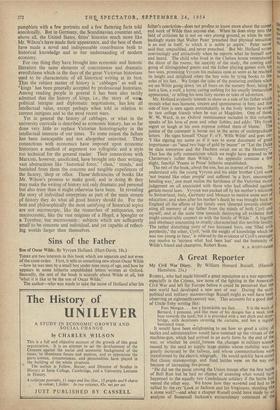Sins of the Father
Son of Oscar Wilde. By Vyvyan Holland. (Hart-Davis. 18s.) THERE are two interests in this book which are separate and not even of the same order. First, it tells us something new about Oscar Wilde —how he was seen by a small boy under nine year of age, and how he appears in some hitherto unpublished letters written at Oxford. Secondly, the rest of the book is scarcely about Wilde at all, but 'what it is like to be the son of Oscar Wilde.'
The author—who was made to take the name of Holland after his father's conviction—does not profess to know more about the career and work of Wilde than anyone else. When he does stray into the field of criticism he is not on very strong ground, as when he mis- leadingly states that Walter Pater 'preached that physical sensation is an end in itself, to which it is noble to aspire.' Pater never said that, unqualified, and never preached. But Mr. Holland writes convincingly and attractively when he reports what he himself sal', and heard. The child who lived in the Chelsea house remembered the decor of the rooms, the sanctity of the study, the coming and going of diStinguished guests and the father playing games with h 9 two sons, promising Vyvyan his malacca cane as soon as he reached its height and delighted when the boy wins by tying books to the soles of his feet. We forget the tales of the posturing aesthete, when we see Wilde going down 'on all fours on the nursery floor, being in turn a lion, a wolf, a horse, caring nothing for his usually immaculate appearance,' or telling his sons fairy stories or tales of adventure. Mr. Holland evidently intends to show us a side of his father which reveals what was humane, sincere and spontaneous in him; and this side of him is seen again unmistakably in the lively letters he wrote to two college friends when he was at Magdalen. One of these, W. W. Ward, in an Oxford reminiscence included in this volume, speaks of his love of pose and other foibles, and adds: 'His frank regret or laugh at his own expense robbed them of blame.' The justice of the comment is borne out in the series of undergraduate letters. He signs himself 'Oscar F. o'F. Wills Wilde' and goes on: 'I like signing my name as if it was to some document of great importance—as "send two bags of gold by bearer" or "Let the Duke be slain tomorrow and the Duchess await me at the Hostelry' That has the jolly romanticism which we might have guessed to be Chesterton's rather than Wilde's. An appendix contains a few slight, fanciful 'Poems in Prose' hitherto unpublished. The rest of the book, about the son, has an interest of its own. To understand why the young Vyvyan and his elder brother Cyril were `not treated like other people' and suffered 'in a hurt, uncompre• hending way,' one must realise the harshness of the Victorian moral judgement on all associated with those who had offended against Pertain moral laws. Vyvyan was packed off by his mother's relations to Switzerland, Italy, Germany and Monaco to receive some sort of education; and when after his mother's death he was brought back to England all the efforts of her family were 'directed towards obliter- ating all memory of my father from the minds of both Cyril and myself; and at the same time towards destroying all evidence that might conceivably connect us with the family of Wilde.' A bigotry and obstinacy amounting to cruelty characterised this terrible family. The rather disturbing story of two harassed boys, one 'filled with perplexity,' the other, Cyril, 'with the weight of knowledge which he was too young to bear,' is relieved by the evidence of Cyril's courage' ous resolve to 'retrieve what had been lost' and the humanity of Wilde's friend and champion, Robert Ross. a. A. SCOTT-JAMF9


































 Previous page
Previous page